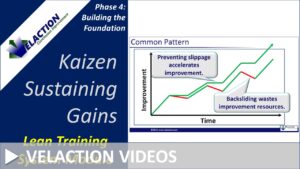> Continuous Improvement Articles
Lean Results: Don’t Believe the Hype (At Least in a Kaizen Report Out)
I place a lot of value on integrity. I was always pretty honest growing up. I once returned a pair of Susan B. Anthony dollars to a lunch lady when she gave them to me instead of two quarters. And my parents had a knack for finding all sorts of things and returning them to their rightful owners. Wallets, a bank deposit bag from a small business, and even a motorcycle helmet once. It rubbed off on me.
Going to West Point solidified that sense of honesty. Cadets live under an honor code, and are not supposed to lie, cheat, steal, nor tolerate those who do.

So when I started working as a Lean practitioner, I faced a personal challenge. I saw a lot of padding of kaizen report out numbers-the ones where people would state the Lean results they achieved. I never got the sense that there was any blatant dishonesty-just a lot of projections, assumptions, and speculation. I, on the other hand, tended to report only what I had actually witnessed.
So I was always a bit self-conscious in my early days of facilitating Lean projects. I delivered great gains, but my results never seemed to be at the top of the pile. I always knew I had helped the team I supported, and felt confident that my work was appreciated, but had that nagging feeling that I was not being seen as measuring up.
That is, until one day during a company meeting when a vice president announced that he had tallied the gains from all the kaizen events that had been conducted on his watch. We were now officially a billion dollar company with only a dozen employees, and could sell off most of our buildings. Plus, we never put out any products with defects anymore.
You see, those Lean results that were reported in the kaizen report outs didn’t quite add up to reality. Projections didn’t always pan out. Assumptions were not always right. And my boss knew it.
I learned a few valuable lessons on that day quite a few years back.
- It’s not the results of the projects that count, it’s the results of the company. Nothing matters unless it makes it to the bottom line. Taking a snapshot of a process that has been in place all of about ten minutes doesn’t always show the whole truth. Now, just to be very clear, I believe in the power of Lean. It delivers improvements. I just always take the results reported from a kaizen with a grain of salt until I see a sustained gain.
- Kaizen report outs are about the process and the people. The real benefit from announcing Lean results in a kaizen report out is in sharing the process that was used to make the improvement, and in recognizing the team.
- No matter how team oriented you are, there’s always a bit of competition. My self-consciousness was about how I appeared to stack up against my coworkers. I face the same challenge today with any claims I make in marketing my Lean training and products. I’m competing with a lot of fantastic claims from other Lean consultants. It is always tempting to push the envelope. In the end, though, I have to feel good that my claims are real. (Notice how seamlessly I slipped in that plug!)
- Your boss knows. Trust me. He or she does. They have a better feel for what is really going on than you give them credit for.
So, what’s your take on the validity of the Lean results you see announced in kaizen report outs (sunset reports)? Is there a bit of inflation to them? I’d love to hear your thoughts or tips on how you have seen them reported more reliably.

2 Comments
Jeff Hajek · February 18, 2010 at 5:06 pm
Brian,
Thanks for the comment. It is nice to know I am not alone in my views.
Jeff
Brian Buck · February 17, 2010 at 12:51 pm
Jeff, I am right there with you.
I had a client change a slide to state they have tripled their gain in dictation savings. When I questioned the client, they advised me they were spreading the savings from the single area where we trialed to all of the areas. Seven months later, they STILL have not spread from the single trial area.
Puffing up your results is kind of an inventory waste for learning. It covers up what really goes on.
I think clients or teams that inflate their improvements feel pressured into a HERO CULTURE. Individuals or departments try to stand out in the pack to be admired because the system rewards that. A lot of organizations have heros at the center of their culture. While Lean thinking is not about heroes and doesn’t reward heroism, that is a MAJOR change for a company (especially in America).